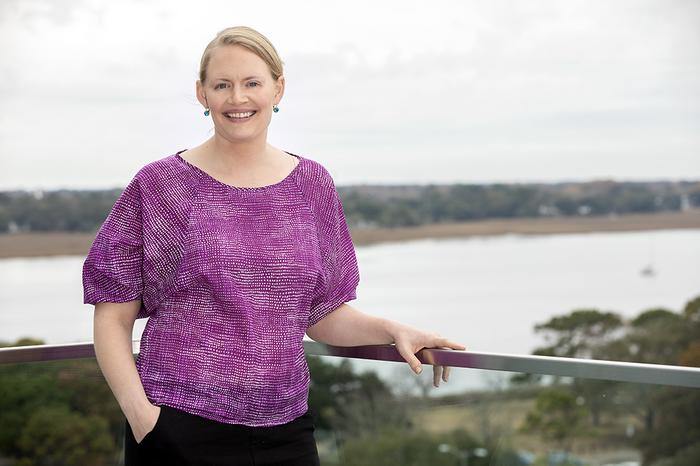Changes to DNA, known as mutations, can increase the likelihood of developing cancer. Specifically, people with mutations in their BRCA 1 and 2 genes are substantially more likely to develop hereditary breast and ovarian cancers. But how do people know if they have these mutations?

Credit: Medical University of South Carolina. Photograph by Sarah Pack.
Changes to DNA, known as mutations, can increase the likelihood of developing cancer. Specifically, people with mutations in their BRCA 1 and 2 genes are substantially more likely to develop hereditary breast and ovarian cancers. But how do people know if they have these mutations?
Genetic testing.
Genetic testing allows doctors to see these microscopic changes. Knowing these mutations exist, doctors will check for signs of breast and ovarian cancers more often.
Yet minorities, especially Black women, are less likely to participate in genetic testing. Even fewer engage in follow-up services, such as recommended interventions, which reduce risk.
To change that, a team of researchers at the Medical University of South Carolina led by Caitlin G. Allen, Ph.D., plans to teach community health workers (CHWs), who often reside in the communities they serve, how to share the importance of genetic screening with their peers. Allen is an assistant professor in the Department of Public Health Sciences at MUSC.
“Community health workers act as a bridge between the community and researchers and clinicians and can help to answer questions, provide support services and address a lot of social determinants of health issues,” said Allen, who has spent more than a decade working alongside and providing support for CHWs.
As a first step, the team worked with CHWs to learn about their needs and preferences for genetics training materials. They describe these efforts in a November article in the Journal of Cancer Education.
Knowing that some minority communities don’t trust researchers and medical staff, Allen and her team recruited CHWs because they are already trusted members of the community. The researchers found that CHWs were already very curious about genetics and eager to learn more.
“There was significant interest from CHWs to learn more about cancer and genetics, but the training to support them in building these competencies and genetic literacy didn’t exist,” explained Allen.
With funding from the American Cancer Society and MUSC Hollings Cancer Center, Allen and her team were able to create this training by holding focus groups with CHWs and doctors, asking them to come to an agreement about which lessons should be included. Once the training materials were developed, the CHWs told the researchers whether they were clear and easy to understand.
Incorporating feedback from these focus groups, Allen and her team finalized their 10-module CHW training called Keeping Each other Engaged Program via IT (KEEP IT). The researchers virtually delivered the 12-hour training to 26 CHWs. The training was effective in improving genetic knowledge and competencies and highly rated by the CHWs. The full outcomes of the KEEP IT training sessions will be published soon.
“It was a privilege to take the idea of CHWs teaching their communities about genetics and put it into action,” said Allen.
But the researchers are far from being finished. They are applying for funding so they can expand the training across four other Southern states.
“Designing and delivering trainings in collaboration with community members is really effective,” stressed Allen, “and it’s important to have community perspective across all research.”
# # #
About MUSC Hollings Cancer Center
MUSC Hollings Cancer Center is South Carolina’s only National Cancer Institute-designated cancer center with the largest academic-based cancer research program in the state. The cancer center comprises more than 130 faculty cancer scientists and 20 academic departments. It has an annual research funding portfolio of more than $44 million and sponsors more than 200 clinical trials across the state. Dedicated to preventing and reducing the cancer burden statewide, the Hollings Office of Community Outreach and Engagement works with community organizations to bring cancer education and prevention information to affected populations. Hollings offers state-of-the-art cancer screening, diagnostic capabilities, therapies and surgical techniques within its multidisciplinary clinics. Hollings specialists include surgeons, medical oncologists, radiation oncologists, radiologists, pathologists, psychologists and other clinical providers equipped to provide the full range of cancer care. For more information, visit hollingscancercenter.musc.edu.
Journal
Journal of Cancer Education
DOI
10.1007/s13187-023-02377-7
Subject of Research
People
Article Title
Development of a Hereditary Breast and Ovarian Cancer and Genetics Curriculum for Community Health Workers: KEEP IT (Keeping Each other Engaged Program via IT) Community Health Worker Training.
Article Publication Date
3-Nov-2023
COI Statement
The authors declare no competing interests.




